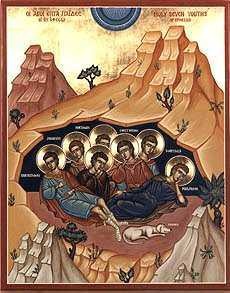|
|||
|---|---|---|---|
| This weekly bulletin insert complements the curriculum published by the Department of Christian Education of the Orthodox Church in America. This and many other Christian Education resources are available at http://dce.oca.org. | |||

The Seven Holy Youths of Ephesus, often referred as the Seven Sleepers, lived in the third century. All seven young men were the sons of a highly-placed official in the court of the Roman Emperor Decius. They themselves were soldiers in the emperor's army. This made them more visible than many other citizens might have been, and they had the very serious problem of being sincere Christians. Decius regarded Christianity as a threat to the empire, and instituted persecutions of Christians more than once during his reign of only a few years. He even used them as scapegoats for a plague that struck Rome, killing nearly 5000 a day. He made an imperial pilgrimage to Ephesus, a city in what is now Turkey, and ordered a festival honoring the pagan gods. He also used the occasion to order that Christians be rounded up and killed. The seven knew they were in immediate danger, because as soldiers of the imperial army they were expected to obey the ruler in everything, including worship of the Roman gods. When they heard that someone in Decius' court had denounced them, they decided to go into hiding. They hurried to Ochlon Hill, outside Ephesus. The hill was full of deep caves, and they took refuge in one of them. When imperial spies told Emperor Decius what his young soldiers had done, he ordered that the cave be sealed up. But a courtier who was sympathetic to the Christians had a copper plate made, as a memorial. We know the names of the seven because the courtier recorded them: Maximilian, Jamblichus, Martinian, John, Dionysius, Exacustodianus, and Antonius. Two hundred years went by. The empire was ruled then by a believing Christian, Theodosius the Younger. But a controversy had arisen in the Church. It was similar,in fact, to a debate in our own day. Some were questioning the reality of the resurrection. The emperor and the Church leaders prayed fervently that somehow the doubters would be convinced of the most basic Christian truth, the resurrection. And God, in His own time, used the Seven Sleepers to answer their prayer. Some shepherds, needing to build pens for their flocks, began taking stones from the walled-up cave. Finally they had taken so many that the cave's opening was revealed. The sleepers awoke and walked out of their hiding place, still young and healthy as they had been two hundred years before.
A week later, the young men died, and this time they would not rise again in this life, but would await the universal resurrection. God had made them part of a miracle when it was most needed, and in His wisdom He knew when that time would be. In Romans 12: 12. Paul writes, "Rejoice in your hope, be patient in tribulation, be constant in prayer." We may rely on God to do things in His own time—perhaps in hundreds of years. Meanwhile we can hope, remain patient, and pray. |
|||
